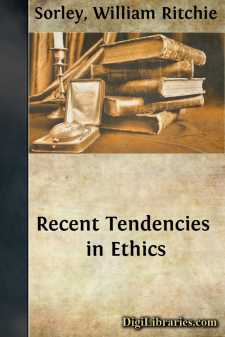Categories
- Antiques & Collectibles 13
- Architecture 36
- Art 48
- Bibles 22
- Biography & Autobiography 813
- Body, Mind & Spirit 142
- Business & Economics 28
- Children's Books 17
- Children's Fiction 14
- Computers 4
- Cooking 94
- Crafts & Hobbies 4
- Drama 346
- Education 46
- Family & Relationships 57
- Fiction 11829
- Games 19
- Gardening 17
- Health & Fitness 34
- History 1377
- House & Home 1
- Humor 147
- Juvenile Fiction 1873
- Juvenile Nonfiction 202
- Language Arts & Disciplines 88
- Law 16
- Literary Collections 686
- Literary Criticism 179
- Mathematics 13
- Medical 41
- Music 40
- Nature 179
- Non-Classifiable 1768
- Performing Arts 7
- Periodicals 1453
- Philosophy 64
- Photography 2
- Poetry 896
- Political Science 203
- Psychology 42
- Reference 154
- Religion 513
- Science 126
- Self-Help 84
- Social Science 81
- Sports & Recreation 34
- Study Aids 3
- Technology & Engineering 59
- Transportation 23
- Travel 463
- True Crime 29
Recent Tendencies in Ethics
Description:
Excerpt
I.
CHARACTERISTICS.
A survey of ethical thought, especially English ethical thought, during the last century would have to lay stress upon one characteristic feature. It was limited in range,—limited, one may say, by its regard for the importance of the facts with which it had to deal. The thought of the period was certainly not without controversy; it was indeed controversial almost to a fault. But the controversies of the time centred almost exclusively round two questions: the question of the origin of moral ideas, and the question of the criterion of moral value. These questions were of course traditional in the schools of philosophy; and for more than a century English moralists were mainly occupied with inherited topics of debate. They gave precision to the questions under discussion; and their controversies defined the traditional opposition of ethical opinion, and separated moralists into two hostile schools known as Utilitarian and Intuitionist.
As regards the former question—that of the origin of moral ideas—the Utilitarian School held that they could be traced to experience; and by 'experience' they meant in the last resort sense-perceptions and the feelings of pleasure and of pain which accompany or follow sense-perception. All the facts of our moral consciousness, therefore,—the knowledge of right and wrong, the judgments of conscience, the recognition of duty and responsibility, the feelings of reverence, remorse, and moral indignation,—all these could be traced, they thought, to an origin in experience, to an origin which in the last resort was sensuous, that is, due to the perceptions of the senses and the feelings of pleasure and pain which accompany or follow them.
With regard to the criterion or standard of morality,—the second question to which I have to call attention,—they held that the distinction between right and wrong depended upon the consequences of an action in the way of pleasure and pain. That action was right which on the whole and in the long run would bring pleasure or happiness to those whom it affected: that action was wrong which on the whole and in the long run would bring pain rather than pleasure to those whom it affected.
From their view as to the origin of moral ideas, the school might more properly be called the Empirical School. It is from their views on the question of the standard of value, or the criterion of morality, that it claimed, and that it received, the name Utilitarian[1]. On both these points the Utilitarian School was opposed by an energetic but less compact body of writers, known as Intuitionists.
[Footnote 1: It seems to have been through J.S. Mill's influence that the term obtained currency. It was used by him as the name of a "little society to be composed of young men agreeing in fundamental principles" which he formed in the winter of 1822-23. He "did not invent the word, but found in one of Galt's novels, the 'Annals of the Parish.'" "With a boy's fondness for a name and a banner I seized on the word, and for some years called myself and others by it as a sectarian appellation" ('Autobiography,' pp....


